Unit 6 How do you feel 单元核心素养演练 习题课件(共15张PPT)
文档属性
| 名称 | Unit 6 How do you feel 单元核心素养演练 习题课件(共15张PPT) |  | |
| 格式 | pptx | ||
| 文件大小 | 110.2KB | ||
| 资源类型 | 教案 | ||
| 版本资源 | 人教版(PEP) | ||
| 科目 | 英语 | ||
| 更新时间 | 2020-07-18 08:35:29 | ||
图片预览

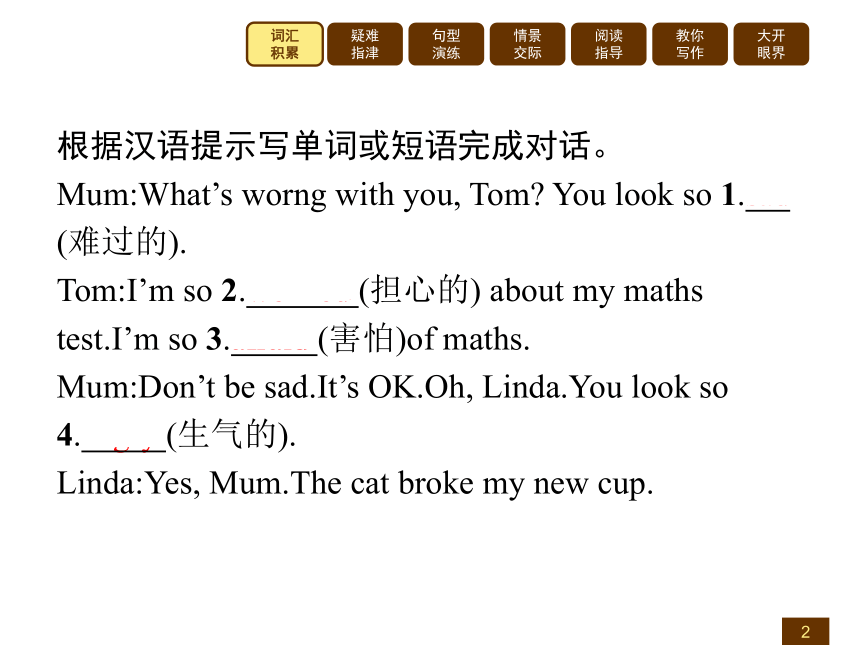
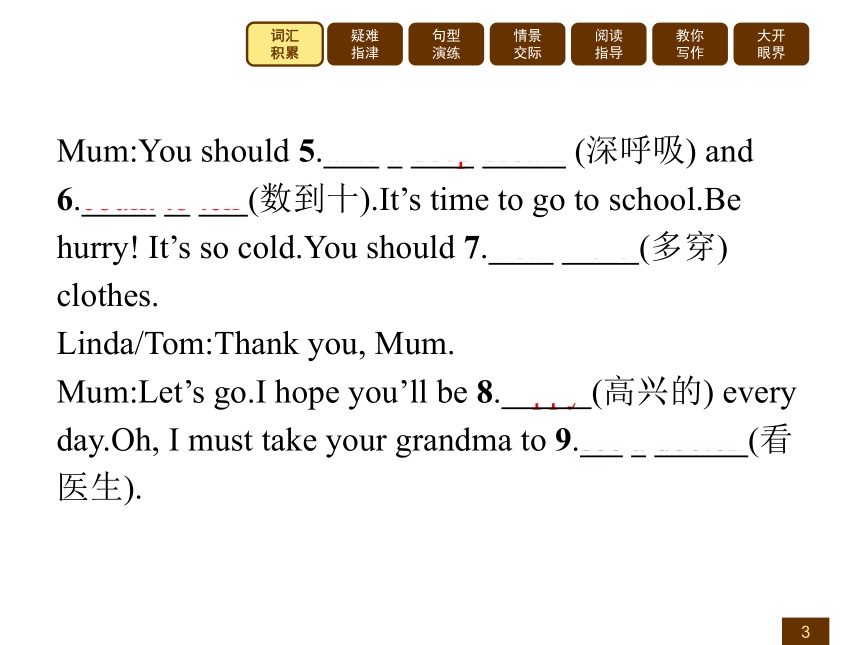
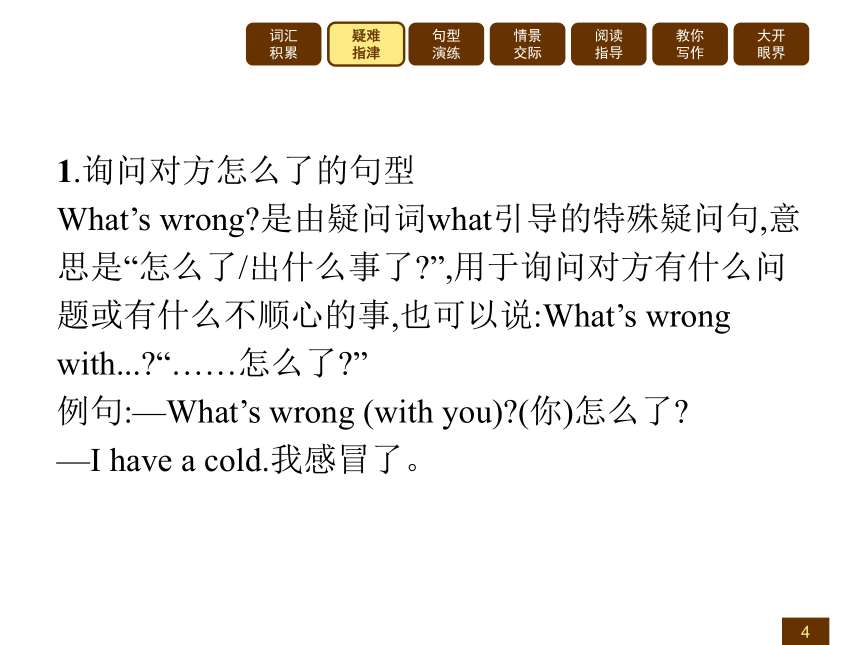
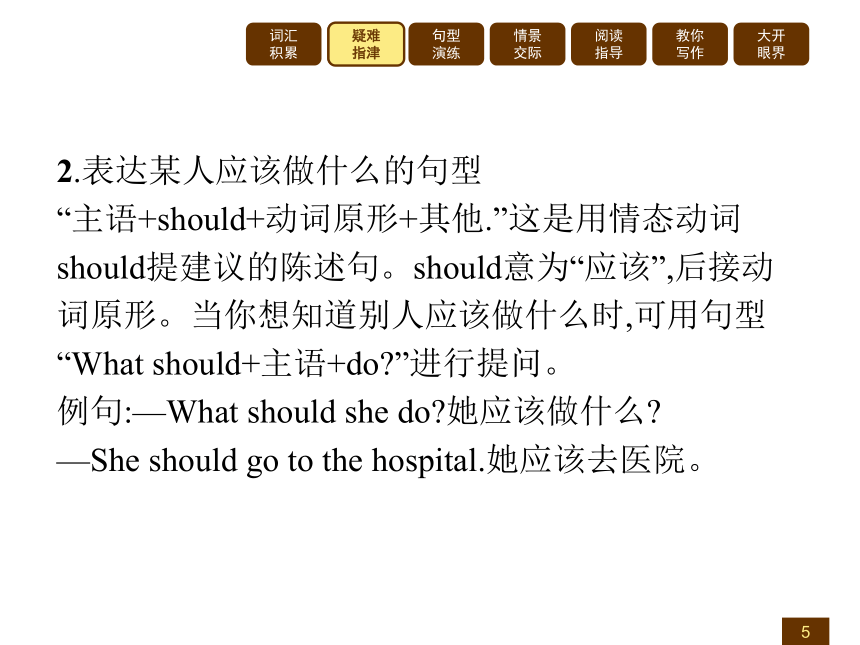
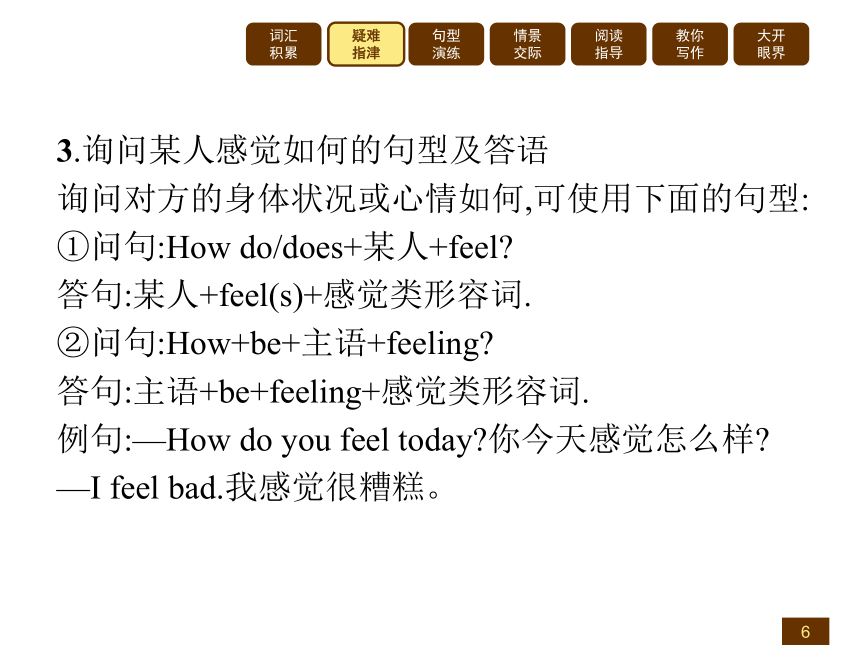
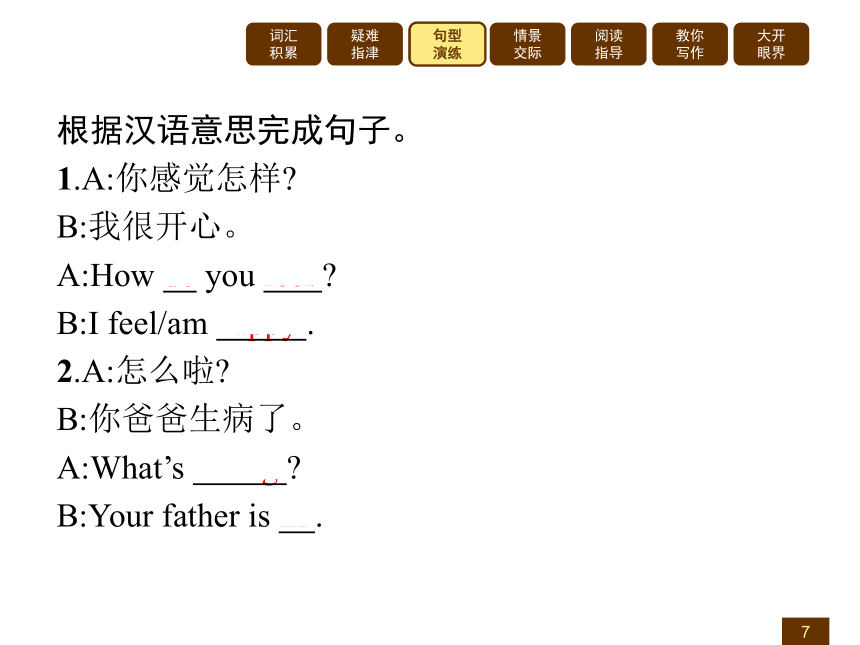
文档简介
单元核心素养演练
根据汉语提示写单词或短语完成对话。
Mum:What’s worng with you, Tom? You look so 1.sad (难过的).
Tom:I’m so 2.worried (担心的) about my maths test.I’m so 3.afraid (害怕)of maths.
Mum:Don’t be sad.It’s OK.Oh, Linda.You look so 4.angry (生气的).
Linda:Yes, Mum.The cat broke my new cup.
Mum:You should 5.take a deep breath (深呼吸) and 6.count to ten (数到十).It’s time to go to school.Be hurry! It’s so cold.You should 7.wear more (多穿) clothes.
Linda/Tom:Thank you, Mum.
Mum:Let’s go.I hope you’ll be 8.happy (高兴的) every day.Oh, I must take your grandma to 9.see a doctor (看医生).
1.询问对方怎么了的句型
What’s wrong?是由疑问词what引导的特殊疑问句,意思是“怎么了/出什么事了?”,用于询问对方有什么问题或有什么不顺心的事,也可以说:What’s wrong with...?“……怎么了?”
例句:—What’s wrong (with you)?(你)怎么了?
—I have a cold.我感冒了。
2.表达某人应该做什么的句型
“主语+should+动词原形+其他.”这是用情态动词should提建议的陈述句。should意为“应该”,后接动词原形。当你想知道别人应该做什么时,可用句型“What should+主语+do?”进行提问。
例句:—What should she do?她应该做什么?
—She should go to the hospital.她应该去医院。
3.询问某人感觉如何的句型及答语
询问对方的身体状况或心情如何,可使用下面的句型:
①问句:How do/does+某人+feel?
答句:某人+feel(s)+感觉类形容词.
②问句:How+be+主语+feeling?
答句:主语+be+feeling+感觉类形容词.
例句:—How do you feel today?你今天感觉怎么样?
—I feel bad.我感觉很糟糕。
根据汉语意思完成句子。
1.A:你感觉怎样?
B:我很开心。
A:How do you feel ?
B:I feel/am happy .
2.A:怎么啦?
B:你爸爸生病了。
A:What’s wrong ?
B:Your father is ill .
3.A:我感觉不舒服,我应该怎么办?
B:别难过,你应该去看医生。
A:I feel ill.What should I do?
B:Don’t be sad.You should see a doctor.
4.A:你爸爸感觉怎样?
B:不太好。
A:How does your father feel?
B:Not well .
Mike很生气,他在向小超人倾诉呢,我们来读一读他们的对话并试着与同桌编新对话吧。
:I’m very angry.My classmate Ben draws on my English book.It’s messy now.?
:Take a deep breath,Mike.Count to ten. Are you feeling better now??
:Yes,I’m better.
:You can tell him that you don’t like that.
:Yes,it’s a good idea.
It’s Sunday.It’s a lovely day.Jenny and her family are having a picnic in a park.Look!Jenny’s brother is flying a kite.He is so excited.Jenny’s father is reading a newspaper.He is happy.Jenny’s mother is making lunch for them.She is tired.Jenny’s little dog gets some chicken from Jenny’s plate.Jenny is angry.
阅读短文,判断句子正“T”误“F”。
( T )1.It’s Monday tomorrow.
( T )2.It’s a sunny day.
( T )3.Jenny is angry because her puppy gets some chicken from her plate.
答题指导
理解句意法。1.由短文第一句“It’s Sunday.”知道“今天是星期日”,由此推断“明天是星期一”,故填“T”。
2.短文第二句“It’s a lovely day.”相当于“It’s a sunny day.”和“It’s a fine day”,都是“天气好”的意思,由此判断此题正确,故填“T”。
3.此题的关键是puppy是little dog的另一种说法,因此此题正确,故填“T”。
在英语中,表示情绪情感的词一般都是形容词,在具体使用时要和系动词连用。
如:I am happy.You/They/We are angry.He/She/It is sad.I don’t feel well.
小试身手
看图,描述场景并给出合理的建议,每幅图不少于三句话。
1.The boy is ill.?
He is so sad.?
He should see a doctor right now.?
2.It’s windy today.?
The man is cold.?
He should wear warm clothes.?
范文赏读?
Wu Yifan is having a P.E.class.
He is so tired.
I think he should do more exercise.
人的情绪和智力
情绪对智力的影响:积极的情绪有助于智力的发展,消极的情绪会抑制智力水平的提高。科学研究表明,情绪积极、乐观的儿童的智力水平要比情绪悲观、忧郁的儿童的智力水平高。智力水平不只体现在智商(IQ)上,而且体现在记忆、思维、创造、想象等众多方面。在学习中,应该保持一种积极的情绪,做到“乐学”,这样会提高学习效果。因为,消极的情绪不仅对提高学习成绩没帮助,而且会影响学习的效果。积极良好的情绪有利于人的智力的发展,有助于人取得好成绩。
根据汉语提示写单词或短语完成对话。
Mum:What’s worng with you, Tom? You look so 1.sad (难过的).
Tom:I’m so 2.worried (担心的) about my maths test.I’m so 3.afraid (害怕)of maths.
Mum:Don’t be sad.It’s OK.Oh, Linda.You look so 4.angry (生气的).
Linda:Yes, Mum.The cat broke my new cup.
Mum:You should 5.take a deep breath (深呼吸) and 6.count to ten (数到十).It’s time to go to school.Be hurry! It’s so cold.You should 7.wear more (多穿) clothes.
Linda/Tom:Thank you, Mum.
Mum:Let’s go.I hope you’ll be 8.happy (高兴的) every day.Oh, I must take your grandma to 9.see a doctor (看医生).
1.询问对方怎么了的句型
What’s wrong?是由疑问词what引导的特殊疑问句,意思是“怎么了/出什么事了?”,用于询问对方有什么问题或有什么不顺心的事,也可以说:What’s wrong with...?“……怎么了?”
例句:—What’s wrong (with you)?(你)怎么了?
—I have a cold.我感冒了。
2.表达某人应该做什么的句型
“主语+should+动词原形+其他.”这是用情态动词should提建议的陈述句。should意为“应该”,后接动词原形。当你想知道别人应该做什么时,可用句型“What should+主语+do?”进行提问。
例句:—What should she do?她应该做什么?
—She should go to the hospital.她应该去医院。
3.询问某人感觉如何的句型及答语
询问对方的身体状况或心情如何,可使用下面的句型:
①问句:How do/does+某人+feel?
答句:某人+feel(s)+感觉类形容词.
②问句:How+be+主语+feeling?
答句:主语+be+feeling+感觉类形容词.
例句:—How do you feel today?你今天感觉怎么样?
—I feel bad.我感觉很糟糕。
根据汉语意思完成句子。
1.A:你感觉怎样?
B:我很开心。
A:How do you feel ?
B:I feel/am happy .
2.A:怎么啦?
B:你爸爸生病了。
A:What’s wrong ?
B:Your father is ill .
3.A:我感觉不舒服,我应该怎么办?
B:别难过,你应该去看医生。
A:I feel ill.What should I do?
B:Don’t be sad.You should see a doctor.
4.A:你爸爸感觉怎样?
B:不太好。
A:How does your father feel?
B:Not well .
Mike很生气,他在向小超人倾诉呢,我们来读一读他们的对话并试着与同桌编新对话吧。
:I’m very angry.My classmate Ben draws on my English book.It’s messy now.?
:Take a deep breath,Mike.Count to ten. Are you feeling better now??
:Yes,I’m better.
:You can tell him that you don’t like that.
:Yes,it’s a good idea.
It’s Sunday.It’s a lovely day.Jenny and her family are having a picnic in a park.Look!Jenny’s brother is flying a kite.He is so excited.Jenny’s father is reading a newspaper.He is happy.Jenny’s mother is making lunch for them.She is tired.Jenny’s little dog gets some chicken from Jenny’s plate.Jenny is angry.
阅读短文,判断句子正“T”误“F”。
( T )1.It’s Monday tomorrow.
( T )2.It’s a sunny day.
( T )3.Jenny is angry because her puppy gets some chicken from her plate.
答题指导
理解句意法。1.由短文第一句“It’s Sunday.”知道“今天是星期日”,由此推断“明天是星期一”,故填“T”。
2.短文第二句“It’s a lovely day.”相当于“It’s a sunny day.”和“It’s a fine day”,都是“天气好”的意思,由此判断此题正确,故填“T”。
3.此题的关键是puppy是little dog的另一种说法,因此此题正确,故填“T”。
在英语中,表示情绪情感的词一般都是形容词,在具体使用时要和系动词连用。
如:I am happy.You/They/We are angry.He/She/It is sad.I don’t feel well.
小试身手
看图,描述场景并给出合理的建议,每幅图不少于三句话。
1.The boy is ill.?
He is so sad.?
He should see a doctor right now.?
2.It’s windy today.?
The man is cold.?
He should wear warm clothes.?
范文赏读?
Wu Yifan is having a P.E.class.
He is so tired.
I think he should do more exercise.
人的情绪和智力
情绪对智力的影响:积极的情绪有助于智力的发展,消极的情绪会抑制智力水平的提高。科学研究表明,情绪积极、乐观的儿童的智力水平要比情绪悲观、忧郁的儿童的智力水平高。智力水平不只体现在智商(IQ)上,而且体现在记忆、思维、创造、想象等众多方面。在学习中,应该保持一种积极的情绪,做到“乐学”,这样会提高学习效果。因为,消极的情绪不仅对提高学习成绩没帮助,而且会影响学习的效果。积极良好的情绪有利于人的智力的发展,有助于人取得好成绩。
同课章节目录
